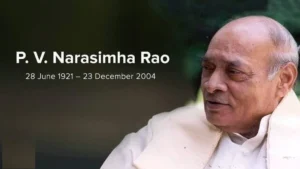
Pamulaparti Venkata Narasimha Rao, commonly known as P.V. Narasimha Rao, stands as a pivotal figure in Indian politics, particularly remembered for his tenure as the Prime Minister of India from 1991 to 1996. Often referred to as the “Father of Indian Economic Reforms,” Rao’s leadership marked a significant turning point in India’s economic trajectory. This article delves into his achievements, contributions, and the criticisms he faced during his tenure.
Achievements of P.V. Narasimha Rao:
 +
+
Economic Reforms: Rao initiated groundbreaking economic liberalization policies in 1991, dismantling the License Raj system and opening up India’s economy to global markets. His reforms ushered in an era of deregulation, privatization, and globalization, laying the foundation for India’s rapid economic growth in the decades that followed.
Foreign Policy: Under Rao’s leadership, India adopted a pragmatic approach to foreign relations, focusing on improving ties with major powers while simultaneously seeking to maintain strategic autonomy. His tenure witnessed significant diplomatic initiatives, including the normalization of relations with Israel and the initiation of the Look East Policy to strengthen ties with Southeast Asian nations.
Strengthening Federalism: Rao emphasized the importance of cooperative federalism, advocating for greater decentralization of power to the states. His government implemented several constitutional reforms aimed at empowering local governments and fostering greater autonomy at the regional level.
Criticism of P.V. Narasimha Rao’s Rule:
Political Controversies: Rao’s tenure was marred by allegations of corruption and political scandals, including the infamous “JMM bribery case” in which members of his government were accused of bribing opposition MPs to secure their support in a crucial vote of confidence. These controversies tarnished his reputation and eroded public trust in his administration.
Communal Violence: Critics accuse Rao of failing to adequately address communal tensions and outbreaks of violence, most notably the Babri Masjid demolition in 1992 and the subsequent riots that engulfed parts of the country. His perceived inaction in preventing or mitigating these incidents raised questions about his commitment to secularism and social harmony.
Legacy of Inequality: While Rao’s economic reforms propelled India towards rapid economic growth, they also exacerbated socio-economic inequalities, widening the gap between the rich and the poor. Critics argue that his policies prioritized the interests of the elite and corporate sector at the expense of marginalized communities, leading to social unrest and discontent among the disadvantaged sections of society.
Political Significance of P.V. Narasimha Rao During His Tenure as PM:
Crisis Management: Rao assumed office at a time of profound economic and political turmoil, following the assassination of former Prime Minister Rajiv Gandhi and amid a balance of payments crisis. His ability to navigate through these challenges with pragmatism and foresight earned him widespread acclaim as a crisis manager.
Coalition Politics: Rao led a minority government, dependent on the support of various political parties, which necessitated skillful coalition management and consensus-building. Despite the constraints of leading a minority government, he effectively negotiated alliances and marshaled support to implement his policy agenda.
Party Reforms: As the leader of the Indian National Congress, Rao undertook significant reforms within the party structure, aiming to revitalize its organizational machinery and adapt to changing political realities. He encouraged intra-party democracy and sought to modernize the Congress party, laying the groundwork for its subsequent resurgence.
Pragmatic Leadership: Rao’s tenure was characterized by his pragmatic and inclusive style of leadership, which enabled him to navigate the complexities of Indian politics and forge consensus on contentious issues. His willingness to engage with diverse stakeholders and prioritize national interest over partisan considerations earned him respect across the political spectrum.
Strategic Vision: Rao articulated a bold vision for India’s future, emphasizing the need for economic reform and modernization to unleash the country’s full potential. His strategic vision encompassed not only economic liberalization but also broader objectives such as social inclusion, technological advancement, and global integration.
Global Engagement: Rao played a proactive role in strengthening India’s ties with the international community, positioning the country as a responsible global actor. He actively pursued diplomatic initiatives to enhance India’s standing on the world stage and leveraged international partnerships to advance India’s strategic interests.

